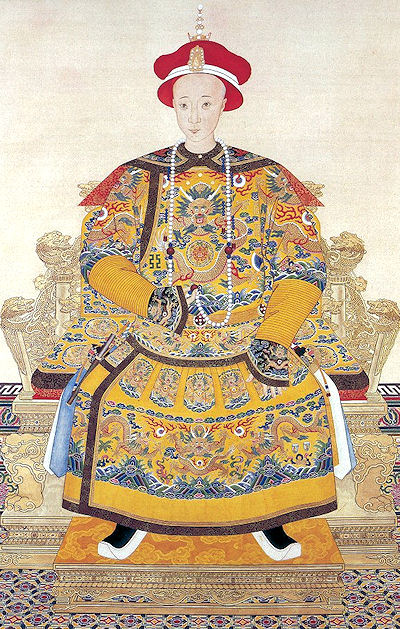Manchu Emperor Tongzhi / Tungche / Tung Chih - 1861-1875

Prince Kung, the sixth son of Tao Kuang and brother of the deceased Emperor Hsien Feng, had not sized up the situation at Jehol a moment too soon. There a coterie of intriguing courtiers, prominent amongst whom were Prince I and Prince Ching, with the statesman Su Shun, had possession of the child Emperor and proposed to inaugurate their command of the situation in connection with the funeral ceremonies of Hsien Feng at Peking. Prince Kung, with admirable insight into the affair, at once secured a sufficient body of troops under General Sheng Pao, produced an edict (supposedly confided to him by the late sovereign just before his death), appointing as Regents the two Empresses Dowager, namely, the widow of Hsien Feng and the mother of the new Emperor.
He then seized the offending princes and Su Shun. The latter was executed, the two former permitted to strangle themselves, and the coup d'etat was accomplished. To make clear the absoluteness of their authority, Prince Kung and the two Empresses now proclaimed the four-year-old boy Emperor under the new title of T'ung Chih.
A striking departure from precedent was made in 1867 in the determination of the Imperial Government to send abroad its envoys. The choice fell upon the Hon. Anson Burlinghame, who had filled for several years the post of U. S. Minister with great acceptance. With him were associated Chi Kan and Sun Kia-kii together with several secretaries and students. Their avowed object was to inform the American and European world of China's desire for progress and, so far as- Mr. Burlinghame was concerned, this was done with an enthusiasm which somewhat misled some of his hearers. The foreign public became immediately attracted by the announced longing of the far East for railways, telegraphs and shipping. In consequence a serious reaction was produced as soon as it was learned that the desire of China for these things had been somewhat overstated.
One thing secured as a result of the Burlinghame Mission to the United States was the signing of a treaty in July, 1863, which is specially interesting to us to-day as encouraging the immigration of Chinese to America. The Treaty "cordially recognizes the inherent and inalienable right of man to change his home and allegiance." The first arrival of Chinese in the United States was in 1848 when two men and one woman arrived at San Francisco in the brig Eagle. Then came the discovery of gold and the lure drew men from every part of the earth. In 1852 over two thousand Chinese came. At first they were cordially welcomed.
By 1872 the young Emperor had reached the age of sixteen, and it was determined to provide him with a consort. The Empress Dowager chose for this high honor the lady Ahluta, daughter of a distinguished literatus, and the wedding was celebrated with great ceremony on Oct. 16, 1872. As the marriage of an Emperor was always assumed to mark his coming of age, the Empresses took the opportunity to surrender into the hands of T'ung Chih the responsibilities of government on Feb. 23, 1873.
Following upon the marriage of the Emperor an event took place of the greatest possible significance. On June 15, 1873, the following Edict appeared: "The Tsung-li Yamen having presented a memorial to the effect that the Foreign Ministers residing in Peking have implored us to grant an audience that they may deliver letters from their Governments, we command that the Foreign Ministers residing in Peking, who have brought letters from their Governments, be accorded audience. Respect this." The audience was given in the "Pavilion of the Purple Light," where it had been usual to receive the tribute-bearing envoys from the barbarians. Six ministers attended, representing Japan, England, the United States, France, Russia and Holland. This was on the 29th of June, 1873. The representatives of the powers were not received in the precincts of the palace proper until 1894.
The Empresses had not long to regret their freedom from the cares of state. The emperor Tung Chi succumbed to an ominously brief and mysterious illness. At the beginning of January, 1875, the youthful Emperor was reported as "happily" suffering from smallpox and on the 12th of the month he passed over to the ancestors. Whether his death was superinduced by poison will never be known. Suspicion is aroused by the fact that the young Empress Ahluta, together with her unborn babe, died two months afterwards. The two Dowagers at once proclaimed the four-year-old child of Prince Ch'un, the seventh son of Hsien Feng. Thus the succession passed for the first time out of the direct line of the Manchu dynasty.
|
NEWSLETTER
|
| Join the GlobalSecurity.org mailing list |
|
|
|

